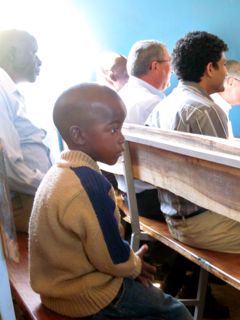Our hearts
are full from all of the good, fun, challenging and amazing things we have seen
in Zambia. After our two-day overnight safari in Botswana, we are starting today
on our journey home (except for Keane and Dr. Thuma who get to stay!).
It was
amazing and fun and exciting and fantastic to get the chance to safari in
Botswana. Our day started early with a drive to the Zambezi river and the
boarder crossing (we have extra stamps in our passports!). Once in Botswana, we
started seeing warthogs IN the city before heading to the park. After tea
(we’ll miss tea!) we had a boat tour of Chobe National Park from the Zambezi
river. Here we saw our first elephants, kudu, water buffalo, monitor lizards
and more. The animals are used to the tour boats coming through the park, and
know that they are not going to be dangerous, and so they hardly move when we
get close to them (birds included!). This made for some close encounters and
great pictures.
 |
| Crossing the Zambezi river to Botswana! |
 |
| Customs in Botswana - Dr. Thuma, Stephne, Emily, Evan, Jackie, and Dan. |
 |
| Amanda walking to our touring boat. |
 |
| Water Buffalo- the African widow maker! |
After lunch
we went out in the Jeeps for a driving tour of the park. Here we saw more
elephants, warthogs, sable antelope, impala, puku, kudu, giraffes, kori bustard,
buffalo, hippos, (and I know I’m missing some). In short- we saw LOTS of
animals- up close, and then headed back to camp for dinner. We camped- but it
was really posh: A) they had set up all the tents and had our beds made (with
really nice beds) before we got there, B) they had chairs set up around an
already burning fire, and were already making dinner for us when we got there,
C) there were flush toilets! D) we were camping under the African stars, E)
there was a lit watering hole where we could watch the animals coming for
dinner. It was a fantastic night, and we slept to the sound of animals in the
distance: hyenas, elephants, and who knows what else!
 |
| Zak is SO happy to see giraffes! |
 |
| Emily and Stephne with an Elephant! |
 |
| Our tour guides were not afraid to drive really close to the animals. |
 |
| The very rare and hard to find Preston/Keane Buffalo |
 |
| The watering hole, Emily, Stephne, Zak, Preston, Jackie, Caleb and Sarah |
Day two we
awoke before the sun, having breakfast under the stars (like our dinner) and
then we bundled up in blankets (it’s COLD in Africa in the winter!) and drove
back to the park to see the animals at the river in the morning. We were told
that the cats and dogs especially are active in the morning. It was cool
(literally) to see the park in the morning, to see the animals waking up or
(for the nocturnal animals) going back to bed (the hippos, it turns out, seem
very lazy). We saw lots of cool animals (a jackal) but no cats… after brunch
back at the camp we headed out for our last chance drive through the park. We
saw hyenas who had been gnawing on an elephant carcass (hyenas are WAY bigger
than I had thought), AND LIONS sleeping in the cool afternoon shade. The lions
were amazing, and when we drove up they woke up and lifted their heads (yes,
there were two, Simba and Nala!). While we were there, elephants started moving
up the hill towards the lions and chased the lions away! It was an elephant/cat
fight! (ok, so not really a fight, but definitely a chase!). Our guide said
that elephants proactively seek out the lions and chase them away to protect
their young (the only elephants small enough for the lions to kill). It was
amazing! And so ended our safari!
 |
| The morning drive was dark and cold - but we didn't complain! Mike, Evan, Zak, Emily, Stephne, and Steve. |
 |
| Mike and the enormous baobab tree! |
 |
| The striped Zebra crossing- and Caleb hanging out the window. |
 |
| An elephant was lion hunting! |
 |
| The Lioness was HUGE and look at the muscles on her legs! |
Then last
evening we had our final night all together in Zambia. We talked about what we
miss from home, and what we will miss from Zambia. And we talked about how we
will see things differently (if you’re from Messiah – how we will see things
anew) after this trip. It was really fun to hear what the students have enjoyed
the most and missed the most- not surprisingly, for most of the students both
were people and relationships: people from home that we miss, and people from
here that we enjoyed getting to know. It was also fun to hear how the students
view of the world, relationships, health, healthcare, and need have changed
during the time here. I am again encouraged that the cross cultural experience
is world expanding – you cannot help but see the world in a different light
after living in a Zambian village for a weekend, after hearing Dr. Thuma talk
about his work here, and after spending so much time with the kids, or each
other on the trip. We leave this morning full – of new things, pictures,
experiences, stories, and love.
 |
| Our Safari Jeep group: me, Mutaa (the guide), Steve, Zak, Sarah, Brandi, Mike, Stephne, Emily, Evan |
See you all
soon.



















































